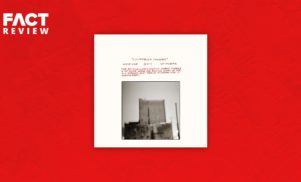Godspeed You! Black Emperor’s latest Luciferian Towers digs through the same political muck the band has been navigating over the past two decades. Louis Pattinson combs through their romantic pessimism and finds more romance than usual on the sixth LP.
Godspeed You! Black Emperor have always known things weren’t going to get better. In a decades-old interview conducted some time around the release of their 1997 debut album F♯A♯∞, the band detailed a hardscrabble punk rock existence in Quebec, Canada that sounded like life lived under a police state. Their political mindset was squarely in opposition to the optimism of the 1990s: Thatcher and Reagan had given way to Blair and Clinton, the West was undergoing a wave of economic prosperity, and Francis Fukuyama’s political bestseller The End Of History had it that we were entering a bold new era of liberal democracy, free from tyrants and dictators of all stripes. Why didn’t these nervy Canadian refuseniks understand that things can only get better?
Two decades later, situated firmly in the time of Trump and Brexit, Godspeed’s worldview – a kamikaze salute to dignified humanity crushed under the merciless boot of capital – has come to look less like apocalyptic fantasy and more like cinéma vérité. Funny thing, though: even as the world rolls to hell in a handcart, Godspeed appear to have lightened up a little bit. On sixth LP Luciferian Towers, they’re still the romantic pessimists of old, but these days, the romance outweighs the pessimism. The album’s liner note, handwritten by Efrim Menuck, strike notes of poetic rapture, even as they dream of waltzing through capitalism’s ashes: “look at that fucking skyline! big lazy money writ in dull marble obelisks! imagine all those buildings much later on, hollowed out and stripped bare of wires and glass, listen – the wind is whistling through all 3,000 of its burning window-holes!” If you’re in search of dour essays on neoliberalism, you won’t find them here.
The album is also missing the quiet-loud dynamic that was so successful for the group early in their career before it threatened to become a predictable post-rock rollercoaster – up, then down, then up again. Towers holds tight to the more nuanced compositional tricks they’ve developed since ending their hiatus in 2012. Take opener ‘Undoing A Luciferian Towers’, which starts with a grand swell of murmuring strings and plodding drums while guests, trumpeter Craig Pederson and saxophonist Bonnie Kane, add to the clamour. Gradually the band starts turning the screw of dissonance, and this big bold wall of sound twists and bends like a backbone on a medieval rack. Then, just as all seems lost, the storm passes and the band march out on a big, rolling riff that positively sashays. It’s a celebratory moment that seems to set the tone for the album itself. That exact melodic theme is reprised later, on album centrepiece ‘Fam_Famine’, a foggily poetic foray into pulsing classical minimalism.
‘Bosses Hang’, the album’s standout, is a piece across three movements that progresses through stirring guitar anthemics, fastidious systems music repetitions, and in its final straits, a race to the horizon set to galloping drums and ornate string serenades. The album’s other large-scale piece is another three-part epic, ‘Anthem For No State’, which from gentle beginnings grows into quite a beast, a lumbering metal groove with shades of Om. Even as they evolve their sound, moments still hark back to Godspeed’s core influences: the barren desert soundscapes of Ennio Morricone; militaristic drumming, used ironically à la anarcho-punks Crass; melodic motifs borrowed from Klezmer music, which offer a subconscious link back to the pain of the 20th Century Jewish experience. All that’s missing here is the wobbly field recordings and snatches of found speech, but now Godspeed can say everything they wish to say using music alone.
Luciferian Towers doesn’t quite feel as significant as their first couple of albums, which benefitted from the shock of the new, but it is proof of their accomplishments as musicians. In 2012 interview with The Guardian, Menuck lamented that GY!BE were viewed early on as gloomy doom-mongers, preachers of the end times: “We wanted to make music like Ornette [Coleman]’s Friends and Neighbors, a joyous, difficult noise that acknowledged the current predicament but dismissed it at the same time”. It feels like now, Godspeed have finally realized that sound. Back in the ’90s, they were portending the complacent of dark times to come. Now, they offer a glimmer of hope, just when we need it most.
Louis Pattinson is on Twitter.
Read next: The 30 best post-rock albums of all time





























